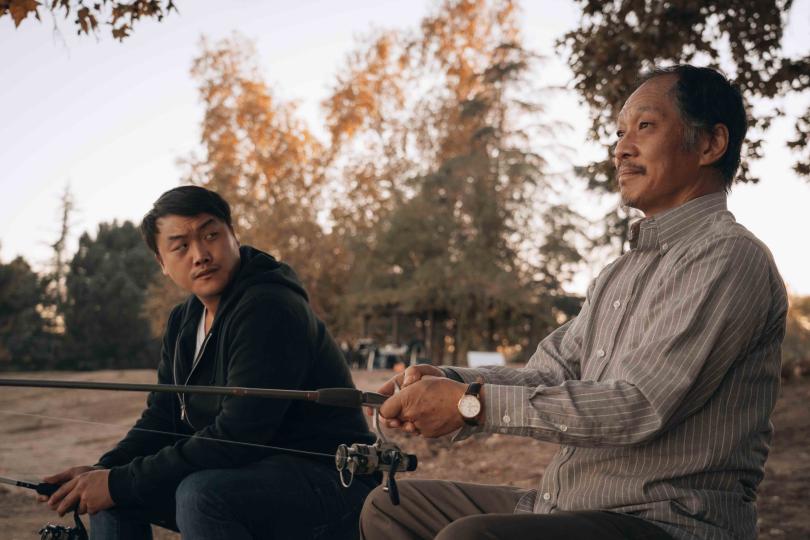Homecoming

“Time is love.” Three plainly spoken words by a woman to the man who broke her heart years ago in the film The Harvest. Doua Moua, who wrote those words and plays Thai, the childhood sweetheart in that scene, knows all too well the meaning of the phrase. His script, about a young man who returns to his family’s home in Long Beach, California to care for his ailing father, has sat on the shelf waiting to be greenlit since Moua’s breakout role as the villainous Spider in Clint Eastwood’s Gran Torino. Fifteen years after that film, Moua is returning to his hometown of Saint Paul with a deeply personal film about a man contending with the question of whether one can really go home again.
Moua’s script loosely dramatizes his own family’s story. Like Thai’s parents, Moua’s mother and father are political refugees who fled the violence sparked by the Laotian Civil War. Moua was born in a refugee camp in Thailand and, six months after, emigrated to the United States with his family where they eventually settled in Saint Paul. It’s a familiar story for so many members of the Hmong community here in the Twin Cities, the largest in the nation. Yet that story has rarely been shown in any form onscreen, all the more reason for Moua to persist in bringing his passion project to life.
“The breakthrough was literally me just saying I'm worth telling the story,” Moua confessed. That breakthrough came during the COVID-19 Pandemic, when the entire industry had seemingly ground to a halt. Moua spent lockdown revisiting Wayne Wang’s groundbreaking 1993 film The Joy Luck Club, itself a sweeping epic of the intergenerational trauma and bonds shared between Chinese-American women and their Chinese immigrant mothers. When June’s (Ming-na) mother, Suyuan (Kieu Chinh), famously tells her that she possesses a “best quality heart”, something clicked for Moua. “I just kind of got to [the point where I] was like, “I need to say yes to myself. I need to really feel like I could do this.” I knew that it's going to be an uphill battle with the industry trying to [argue] that this is a relevant story to tell and this is an important story to tell.”
From the beginning of his career, Moua found support from organizations like the Center for Hmong Arts and Talent (CHAT) in Saint Paul to help him realize the potential “to tell our stories” through performance. As he developed The Harvest, Moua found a groundswell of support from the Coalition of Asian Pacifics in Entertainment (CAPE) which, as part of their mission to “advance[…] representation for Asian American and Pacific Islander creators and executives in Hollywood”, features a list of unproduced screenplays in the hopes of connecting filmmakers with investors. For Moua and other AAPI artists, such organizations are critical “to put eyes on different projects that writers [from underrepresented communities] don't get that chance” to produce otherwise.
Now The Harvest is making its local premiere in the Twin Cities, Moua is feeling a mixture of excitement and nerves about its reception within the Hmong community (the only member of his family who has seen the film is his younger sister). Without giving away the plot, Thai’s family dynamics become increasingly fraught as the mercurial patriarch Cher (Perry Yung) seeks to impose his will on the family as end-stage renal failure increasingly deprives him of control over his own body. Cher’s staunchly conservative views of Hmong customs clash with his family’s desire to assimilate into modernity, even as they strive to honor their cultural heritage. As long-buried secrets are laid bare and taboo subjects are breached, the film’s emotional tenor erupts with raw ramifications.
“I’m even hesitant when this come to the Minneapolis St Paul International Film Festival!”, Moua confesses. “I'm kind of scared for my parents to watch it and I lose all my friends. There’s going to be a lot of stuff in the film that you guys might not like about it and shown about it.” Moua’s father is also named Cher and experienced kidney failure, and his onscreen avatar expresses his fear, rage, and sorrow in often cruel ways. Yet Moua’s priority was to humanize his characters rather than judge them or present them in a disingenuously sanctified light. “The thing is that for me as a writer to not be afraid to write something that will resonate and will start a conversation, even though you don't want the conversation now. But like in two weeks or a month or a year, you will reflect and say, “I remember that. And I see myself how can I fix myself or how can I grow from this film?””
For Moua, starting a conversation is only the beginning. While a slate of commercially and critically successful films by Asian and Asian-American filmmakers have marshaled the call for more inclusive stories, his vision includes providing the resources for members from his community to tell their stories on their terms. “My goal was to bring back The Harvest to Minnesota, to give jobs to hundreds,” Moua explains. “That itself will help boost our economy in Minnesota, especially with the Hmong community or the Southeast Asian community or the filmmaking community in Minnesota.” Legislative action would have to be taken for creating the tax incentives needed for a local production hub to thrive. Yet Moua views it as entirely possible. “One of the great things about Minnesota is that if we make something together, we literally push it to its heights together.”
Should a production hub pop up in the Twin Cities, as it has in cities like Atlanta, Moua would “move back home if I know… I could just work in back in Minnesota.” He hopes to lead by example through his years of perseverance and dedication to elevating the voices and stories of Hmong-Americans. “If I fail, my community is going to think it's not possible, and that's why I'm still here,” he reasons. Yet Moua has no reason to be pessimistic, not while he basks in this long-awaited triumphal return to the cities which sparked his artistic and personal awakening. His homecoming, he hopes, will inspire a new generation to do what he did decades ago: “Dream big and go out there.”
The Harvest can be seen as part of this years Minneapolis St. Paul International Film Festival. You can find details for this film and all the other films on their website: https://mspfilm.org/festivals/mspiff/




